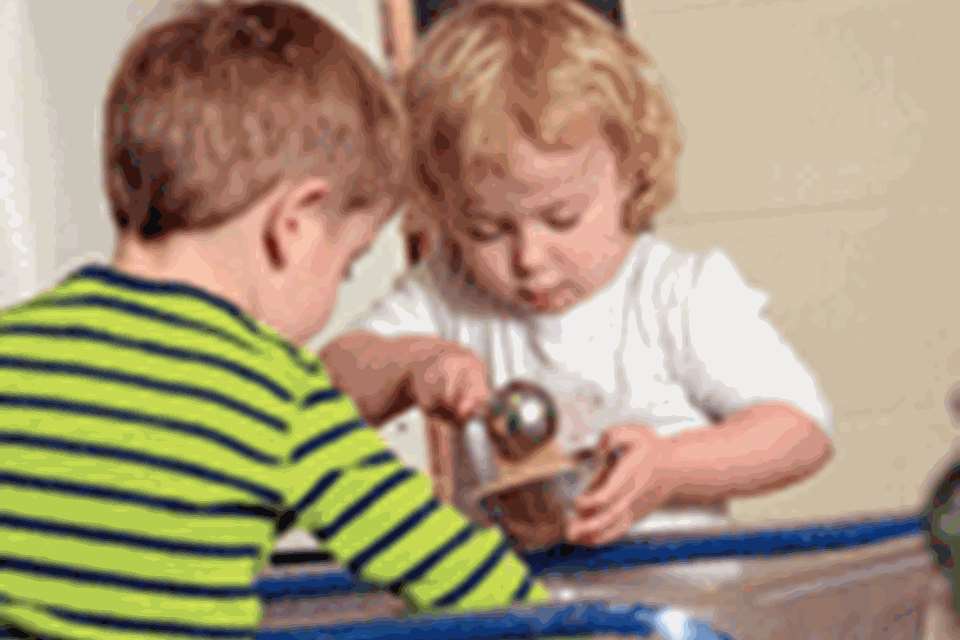Learning & Development: Assessment - Right on
Jan Dubiel
Monday, February 10, 2014
Whatever new criteria are given to us, assessment remains an essential expression of our values as practitioners and defines how we support children as learners, argues Jan Dubiel of Early Excellence.

Each one of us has an individual set of values - beliefs, ideas and philosophies that we consider to be intrinsically important - and we place these at the centre of what we do, consciously and subconsciously. We view the world, and act within it, through what might be described as a 'value prism' that guides our thoughts, actions and decisions.
Our work as early years practitioners is equally influenced by this, and the decisions we take during our day-to-day engagement with children are an expression of those intrinsic beliefs. Most practitioners have decided to pursue a career in early years because this enables them to act on these values and contribute to shaping the possibilities and life chances of future generations.
It enables them to reflect those values on to the children they work with and support them in becoming the future citizens of a world we will be proud of. Each decision taken, interaction initiated, activity planned and observation made reflects that aspiration to equip children fully as responsible, creative, independent and resilient learners and thinkers.
DEFICIT MODEL
A vital part of this process is the 'assessments' made of children's learning and development. The word assessment has accumulated a large amount of baggage and an unfair association with measuring, judging and quantifying children's learning, often in a negative 'deficit model' approach that focuses on what children cannot do and how far they are 'below expectation'. In fact, this is far from the truth.
Assessment is knowing and understanding the children, enabling practitioners to plan and facilitate children's ongoing learning and development. It is answering the question, 'What do I know about this child, and what can I do to continue supporting and challenging them?' In reality, this happens all the time.
In the hundreds of decisions that practitioners take daily, most of these entail this kind of consideration, and with experience this can often become an intuitive act. In short, assessment is a vital, irreplaceable aspect of pedagogy and defines how practitioners successfully support children as learners.
What practitioners know - or choose to know - about children is an expression of the values they believe are important, intuitively identifying and supporting those aspects and behaviours that demonstrate the qualities children will need to be 'successful' in all kinds of ways.
Coupled with their knowledge of child development, the curriculum and their pedagogical understanding of how this can be facilitated, early years practitioners create opportunities, experiences and interactions that fulfil the trajectory of children as learners and thinkers.
So the constantly changing national and Government-defined landscape of early years assessments - the Early Years Foundation Stage (EYFS) profile, the possible introduction of baseline assessments in Reception, the use of Development Matters and Early Years Outcomes to describe progression - should in themselves not alter a practitioner's core values nor their approach to pedagogy.
DOING IT RIGHT
Any new Government initiative, or the introduction of a new system or document - statutory or otherwise - invariably leads to new anxieties and practitioner concerns about needing to 'do it right', even if this means compromising their intrinsic values and what they know is right for children as skilled, informed and intuitive professionals.
So it is important for practitioners to be aware of their values and their knowledge of children as learners, and to be equally aware that as national requirements might change their role will continue to be supporting and challenging children's learning and development through the assessments that they make.
In this context, it is also important to clarify what assessment consists of and how this needs to reflect the realities of the role of the practitioner. In essence, it could be argued that assessment is responding to the following four questions, within which the principles of effective assessment are underpinned.
What information do I want to gather?
What is really important to know about the children I work with? What are the kinds of things that will help me understand them as learners? Obviously, children's knowledge and understanding within the statutory prime and specific areas of development will be part of this.
Also, their 'learning behaviours' as described in the statutory Characteristics of Effective Learning are a critical way in which children are understood and supported. Most of all, the information needs to be 'significant', in that it helps the practitioner understand the child.
How will I make sure I have the information I need?
Since you need to be sure that what is known about children is accurate and authentic, observing them in self-initiated activities will be the main means of getting information. When children are involved in their own ideas and projects, they draw together all the learning they will need to express an idea, construct, communicate, tell a story or problem solve.
There will be times when this observation needs to be a detached narrative of what they are doing, but the majority of time these observations happen in the moment and occur alongside interaction and conversations with the children themselves. Equally, the views of other practitioners who work with them, the views of the children's parents or carers and the child's own view will need to contribute to this to ensure that it is a 'real' description.
What will I need to record and document?
Too much valuable time can be spent writing down observations and information that don't tell practitioners anything new. When this becomes excessive it can actually prevent them from doing the most important thing - interacting with children.
Documents and records are primarily for the practitioner to recall and understand what they need to know - as a professional educator - about the children they work with. This will vary from person to person, depending on experience, knowledge and memory.
Again, the key word in this is 'significant'. Practitioners might need to record the things that really matter, or the incidents and observations that they might later forget.
What will I do with the information I have?
The purpose of assessment is to support children's ongoing learning and development, so the information gleaned from observations and conversations detailing the significance of this needs to relate directly to interaction and planning. Sometimes this happens in the moment; sometimes it informs a mediumor long-term plan for activities or provision.
Of course, assessment does serve another purpose - that of accountability - and it is through describing children's individual journeys that practitioners and settings can demonstrate the impact they are having and the progress that children are making.
However, it is important that when this is discussed it is the same information that comes from everyday ongoing assessment and not assessments created separately.
Jan Dubiel is national development manager for Early Excellence, www.earlyexcellence.com
READER OFFER
Effective Assessment in the Early Years Foundation Stage by Jan Dubiel (Sage, February 2014) provides a clear explanation of the role of assessment in the revised EYFS, and step-by-step guidance for those working with children from birth to five on making and recording observations in practice. Key elements of the book include: using assessment to support learning and development, detailed guidance on the age two progress check, developing an evidence-based understanding of assessment, and case studies.
A 20 per cent discount on this title is available to Nursery World readers. Simply enter the discount code UK14SM04 at checkout when ordering online at www.sagepub.co.uk. The offer is valid until 31 March.
[asset_library_tag 315,Download the PDF]












